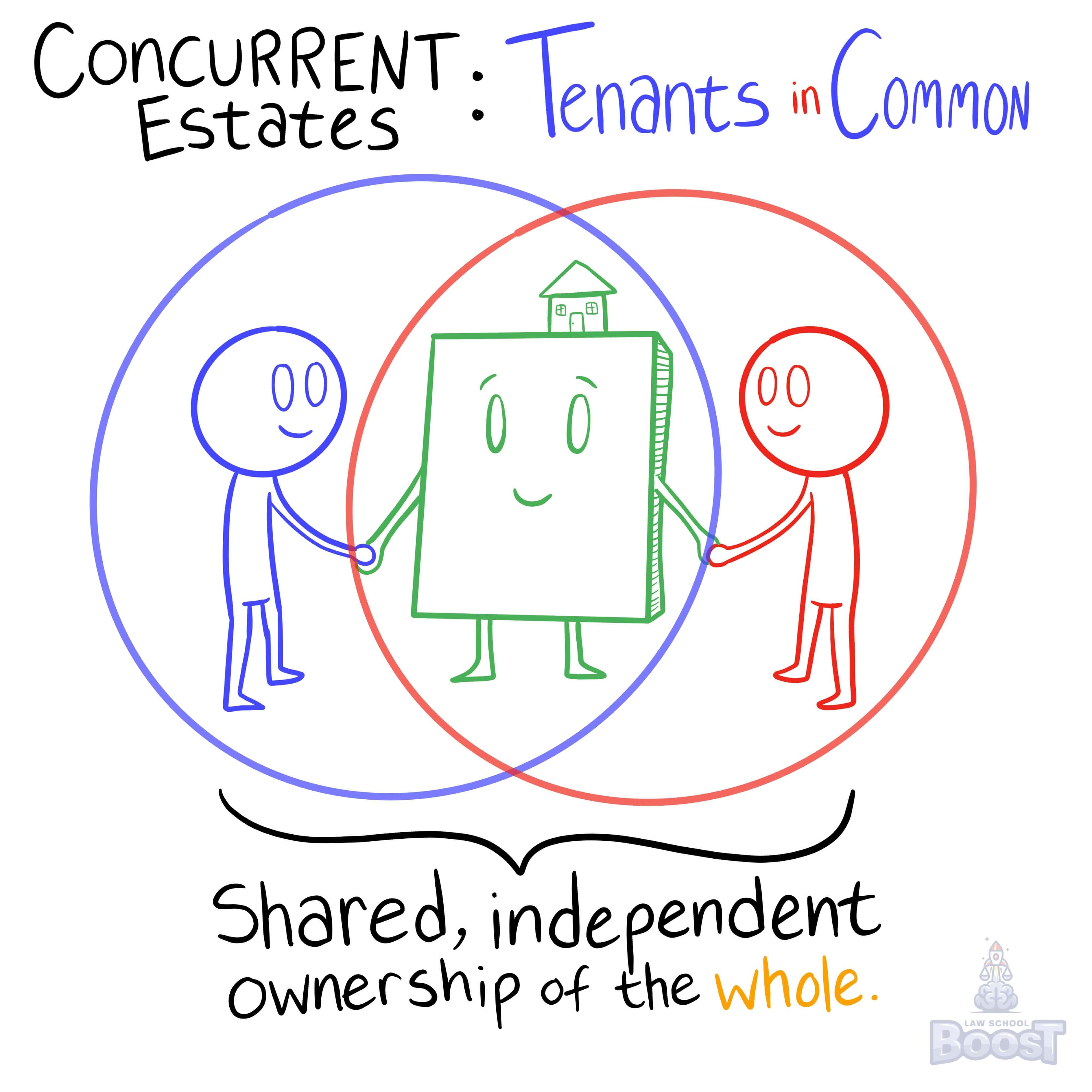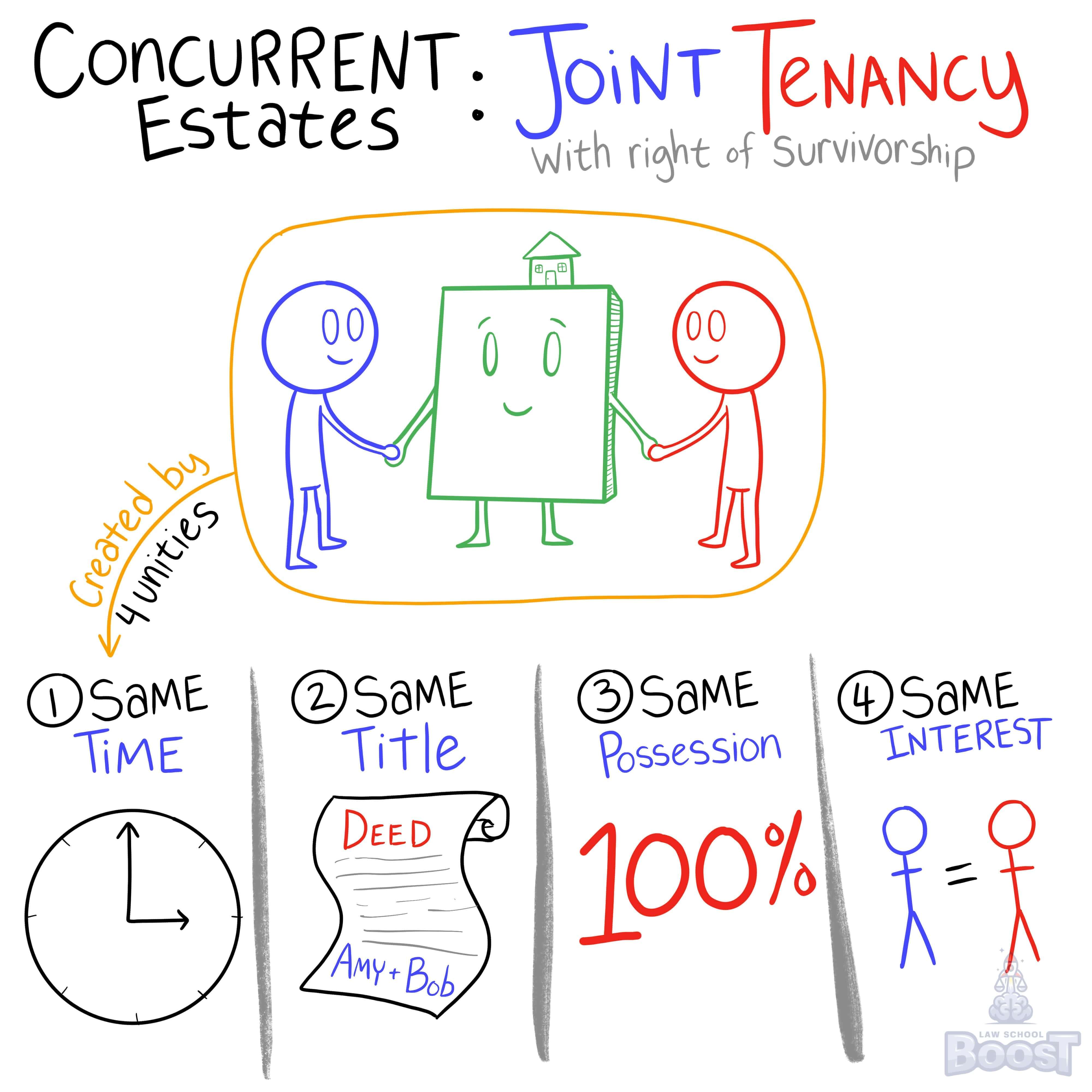😀
Real Property • Concurrent Estates
PROP#050
Legal Definition
Transactions that may not result in severance include: (1) judgment liens, (2) mortgages (in lien theory states); and (3) leases.
Plain English Explanation
On an exam, when you identify the existence of a joint tenancy, it's common for the fact pattern to involve various types of scenarios involving one of the joint tenants doing something that looks like it severs the joint tenancy. Usually this will involve one of the parties undermining one of the 4 unities that create a joint tenancy (time, interest, possession, and title).
However, don't be fooled by the following transactions that will not sever a joint tenancy:
(1) Judgment liens, which means one of the joint tenants has lost in court and a plaintiff has received a lien on the joint tenant's real estate interest. A lien is a right to keep possession of property belonging to another person until a debt that is owed is paid. So it may appear like this would sever a joint tenancy, but it does not.
(2) Mortgages, which means one of the joint tenants has gotten a mortgage on their interest of the property. Note that in half of jurisdictions, a mortgage is a transfer of title (sometimes called "title theory"), which then destroys joint tenancy. However, in most jurisdictions, a mortgage isn't a problem as long as there is no foreclosure.
(3) Leases, which means one of the joint tenants leases their interest to someone else. On its face, a lease seems to destroy at least 2 of the 4 unities (interest and possession), which would usually count as a severance of the joint tenancy. However, most states do not see it this way (though some do). Thus, there's nothing stopping a joint tenant from leasing their interest.
However, don't be fooled by the following transactions that will not sever a joint tenancy:
(1) Judgment liens, which means one of the joint tenants has lost in court and a plaintiff has received a lien on the joint tenant's real estate interest. A lien is a right to keep possession of property belonging to another person until a debt that is owed is paid. So it may appear like this would sever a joint tenancy, but it does not.
(2) Mortgages, which means one of the joint tenants has gotten a mortgage on their interest of the property. Note that in half of jurisdictions, a mortgage is a transfer of title (sometimes called "title theory"), which then destroys joint tenancy. However, in most jurisdictions, a mortgage isn't a problem as long as there is no foreclosure.
(3) Leases, which means one of the joint tenants leases their interest to someone else. On its face, a lease seems to destroy at least 2 of the 4 unities (interest and possession), which would usually count as a severance of the joint tenancy. However, most states do not see it this way (though some do). Thus, there's nothing stopping a joint tenant from leasing their interest.
Hypothetical
Hypo 1: Amy and Bob are joint tenants with right of survivorship in Blackacre. One day, Amy accidentally hits Paul with her car. Paul sues Amy for injuries and wins money damages against her. To secure the money Amy owes him, Paul gets a lien placed on her Blackacre interest. Result: Amy and Bob are still joint tenants.
Hypo 2: Same facts as Hypo 1, except Paul decides to force a judgement sale to get his money. Carl shows up and buys Amy's interest in Blackacre. Result: Amy and Bob's joint tenancy has been severed. Bob and Carl are now tenants in common.
Hypo 3: Same facts as Hypo 2, except before Paul forces a judgment sale, Amy dies. Result: Paul gets nothing. Why? Because Amy and Bob were joint tenants with right of survivorship, and the moment Amy died, her interest was absorbed by Bob who now owns Blackacre by himself.
Hypo 4: Amy and Bob are joint tenants in Blackacre. Amy mortgages her interest in Blackacre to Lender. Amy dies. Result: In a lien theory state, Amy's mortgage does not sever joint tenancy. Thus, when she died, Bob absorbed her interest and Lender has no ability to collect Amy's debt. However, in a title theory state, Amy would have transferred her title in exchange for the mortgage, which would have severed the joint tenancy, which means after she dies Lender can collect against her estate as a tenant in common with Bob.
Hypo 2: Same facts as Hypo 1, except Paul decides to force a judgement sale to get his money. Carl shows up and buys Amy's interest in Blackacre. Result: Amy and Bob's joint tenancy has been severed. Bob and Carl are now tenants in common.
Hypo 3: Same facts as Hypo 2, except before Paul forces a judgment sale, Amy dies. Result: Paul gets nothing. Why? Because Amy and Bob were joint tenants with right of survivorship, and the moment Amy died, her interest was absorbed by Bob who now owns Blackacre by himself.
Hypo 4: Amy and Bob are joint tenants in Blackacre. Amy mortgages her interest in Blackacre to Lender. Amy dies. Result: In a lien theory state, Amy's mortgage does not sever joint tenancy. Thus, when she died, Bob absorbed her interest and Lender has no ability to collect Amy's debt. However, in a title theory state, Amy would have transferred her title in exchange for the mortgage, which would have severed the joint tenancy, which means after she dies Lender can collect against her estate as a tenant in common with Bob.
Visual Aids


Related Concepts
In assessing the rights and duties of co-tenants, are encumbrances allowed?
In assessing the rights and duties of co-tenants, what are rents and profits?
In assessing the rights and duties of co-tenants, what is a judicial partition?
In assessing the rights and duties of co-tenants, what is contribution?
In assessing the rights and duties of co-tenants, what is possession?
What are the rights and duties of co-tenants?
What effect does a testamentary disposition have on a joint tenancy with right of survivorship?
What is a concurrent estate?
What is a tenancy by the entirety and how is it severed?
What is a tenancy in common?
What is required to establish a joint tenancy with right of survivorship?
What is the result of a joint tenancy that is severed?


